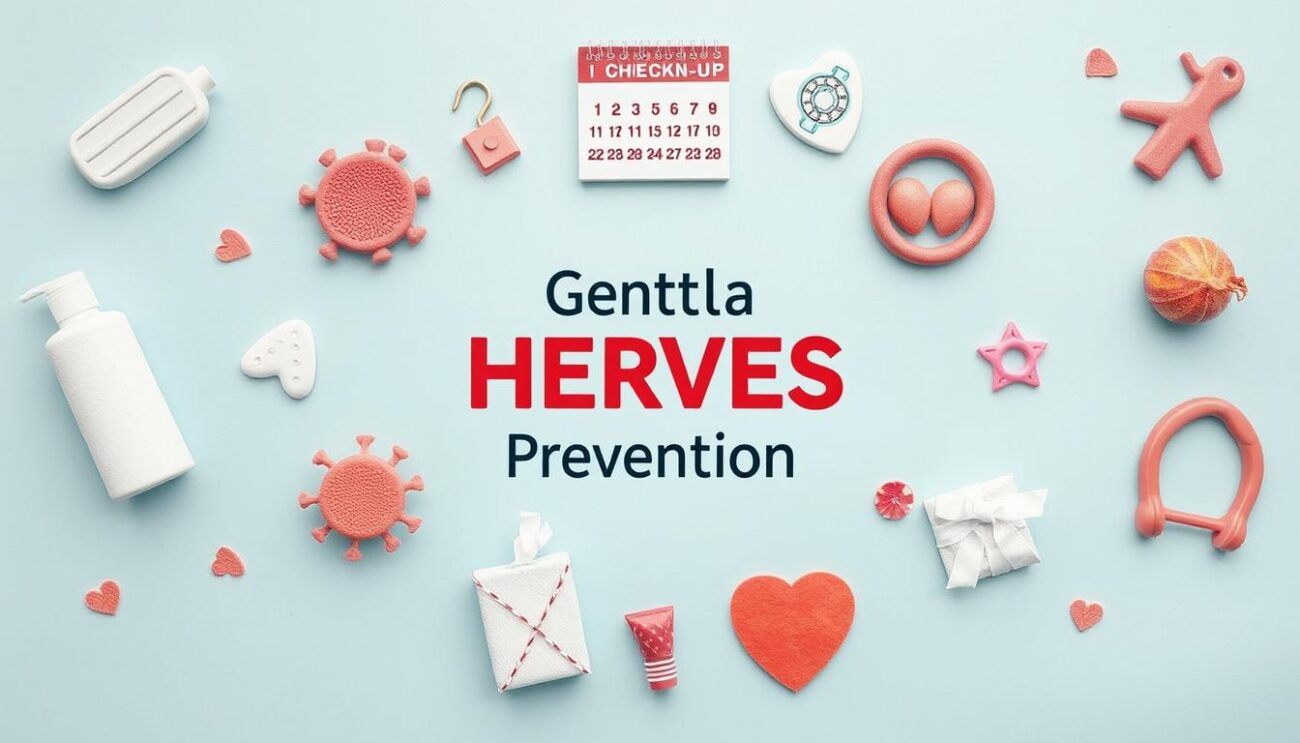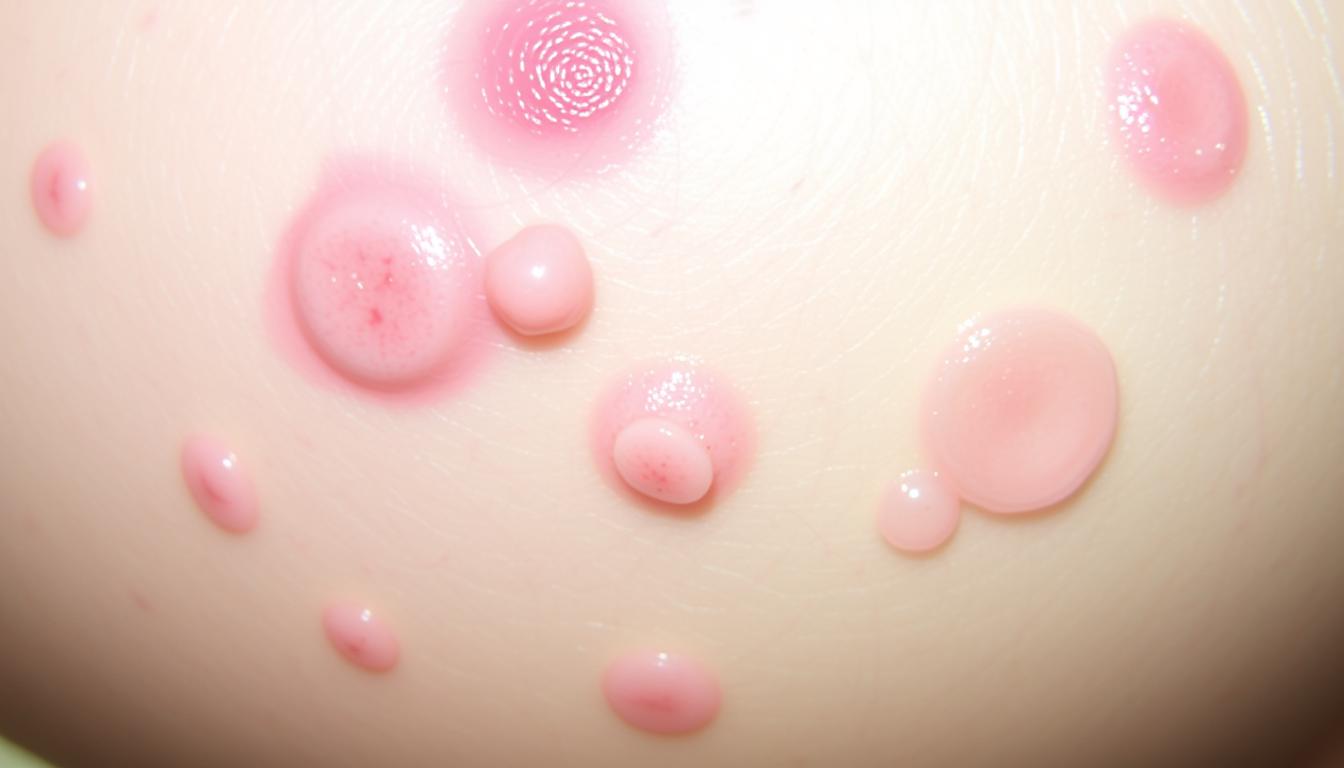Do you have questions about genital herpes? Do you want to know how to identify the symptoms? This visual guide is here to help you. It shows the pictures of genital herpes to better understand this disease.
You will learn about the causes, how it is transmitted, and the signs in women and men. You will also know when it appears and how long it lasts. There is information on the risks, treatments and how to avoid recurrences.
What is genital herpes?
Cause of genital herpes
Genital herpes is a disease transmitted through sexual contact. It is caused by the herpes simplex virus , type 1 (HSV-1) or type 2 (HSV-2). HSV-1 is often found in the mouth and can spread to the genitals. HSV-2 directly affects the genitals.
Once infected, the person keeps the virus for life. This virus can wake up and cause flare- ups .
In France, 20% of sexually active adults are affected by genital herpes . It mainly affects young adults aged 25 to 35. The virus is often transmitted during sexual intercourse with a sick partner or during contact with a carrier without visible lesions.
Nearly 50% of first infections are due to HSV -1 . This is due to the development of oral-genital sexual intercourse since the 1980s. Recurrences are more frequent in the first months after infection than later.
Stress, fatigue, another infection, lowered immunity or hormonal changes can cause recurrences of genital herpes .
How is genital herpes transmitted?
Genital herpes is most commonly transmitted through sexual intercourse. This includes vaginal, anal, or oral sex, even without penetration. Sharing sex toys can also help transmit genital herpes .
An infected woman can pass the virus on to her baby. This can happen during pregnancy or childbirth. These transmissions can cause serious problems for the newborn.
Many infected people do not show signs. The virus can be transmitted even without visible spots or lesions. This means that genital herpes transmission is possible without symptoms.
Pregnant women with genital herpes should take antiviral medication. This starts at the 36th week of pregnancy. This helps prevent outbreaks during childbirth and breastfeeding.
Women with active symptoms on the day of delivery are at risk of transmitting the virus. This can cause serious problems such as blindness or skin infections.
In short, genital herpes is often transmitted through sexual intercourse . It can also be transmitted through sex toys or mother-to-child transmission during pregnancy and childbirth. It is important to remain vigilant, as transmission can occur even without symptoms.
genital herpes photo
Genital herpes photos show the stages of this infection. They range from the first symptoms of genital herpes to more advanced stages. The formation of herpes vesicles and herpes lesions can be seen .
Symptoms of genital herpes
10 to 15 days after unprotected sexual contact, symptoms appear. The first signs are painful blisters on the skin or genital mucous membranes. There is also itching, redness, pain during urination and defecation, and swelling of the lymph nodes.
Herpes lesions are often found on the penis, vulva, vagina, perianal area, urethra and cervix. They develop into painful ulcers after bursting.
| Image type | Number |
|---|---|
| Photos of herpetic lesions | 4 |
| Images of herpetic blisters | 3 |
| Illustrations of the herpes virus | 2 |
| Electron micrographs of the virus | 42 |
These genital herpes photos help to understand the infection and its visual manifestations.
” Treatment for genital herpes includes antiviral medications such as Acyclovir or Valacyclovir. A healthcare professional prescribes these medications. Antiviral ointments may also be used to relieve symptoms and prevent transmission.”
Symptoms in women
In women, the first signs of genital herpes often include symptoms similar to those of the common cold. You may experience fever, fatigue, headache, and body aches. You may also have difficulty urinating.
The blisters usually appear on the vagina, cervix, vulva, and sometimes near the anus. Inguinal lymph nodes are common during the first outbreak of herpes in women .
Lesions on the woman’s vulva can be very painful and uncomfortable during this period. However, in one third of cases, the first genital herpes infection is not symptomatic. The herpes simplex virus type 2 (HSV2) is responsible in 60 to 80% of cases.
“In women, the first outbreak of genital herpes is often accompanied by flu-like symptoms and difficulty urinating.”
The virus remains in the body for life, but recurrences usually last between 7 and 10 days. About 20 to 40% of genital herpes cases are caused by herpes simplex virus type 1 (HSV1). It is crucial to consult a healthcare professional in case of persistent or unusual symptoms to obtain a proper diagnosis and treatment.
Symptoms in men
The first outbreak of genital herpes in men causes symptoms similar to the flu. Blisters are seen on the penis, testicles, near the anus, on the thighs or buttocks . Inguinal lymph nodes may also appear.
The HSV2 virus is often the cause of genital herpes . But the HSV1 virus can also cause herpes, especially through oral-genital contact. The rashes appear on and around various genital areas.
Genital herpes can remain dormant for years . However, symptoms such as tingling, itching, and sores may return. Antiviral treatments help relieve symptoms and reduce the duration of outbreaks .
A man with genital herpes is contagious 24 hours before symptoms appear . He remains contagious until the lesions have healed, about ten days . It is crucial to take measures to prevent transmission of the virus.
| Symptoms of genital herpes in men | Delay of appearance |
|---|---|
| Tingling, itching, blisters on the penis, testicles, anus, thighs, buttocks | Between 6 and 10 days after contamination |
| Swollen inguinal lymph nodes | Usually at the same time as other symptoms |
Duration of a herpes outbreak
The duration of a herpes outbreak varies depending on the stage of the infection. The first herpes outbreak can last 1 to 3 weeks without treatment. Subsequent outbreaks are often shorter and less severe, thanks to antibodies.
HSV-2 is the most common virus in genital herpes, affecting approximately 70% of cases. Recurrent HSV-2 infections are very common, affecting 98% of patients.
| Type of infection | Average duration |
|---|---|
| First outbreak of herpes | 1 to 3 weeks |
| Next pushes | Generally less severe and shorter in duration |
The immune response helps reduce the severity of genital herpes recurrences. But, antiviral treatment is crucial to limit the duration and severity of episodes.
“Aux États-Unis, plus d’une personne sur six âgée de 14 à 49 ans est atteinte d’herpès génital.”
Délai d’apparition des symptômes
Quand on est infecté par le virus de l’herpès génital, les symptômes ne se voient pas tout de suite. Il faut jusqu’à 12 jours pour que les premiers signes apparaissent. En moyenne, le délai d’apparition des symptômes d’herpès génital est de 6 à 10 jours après la contamination.
Le temps que cela prend varie beaucoup d’une personne à l’autre. Certains ressentent les symptômes plus vite, d’autres plus tard. Le système immunitaire joue un grand rôle dans ce délai.
La première fois, les symptômes sont plus forts et durent plus longtemps. Mais à la suite, ils apparaissent plus vite, en 2 à 12 jours. Il y a aussi des périodes où on ne sent rien, mais le virus est là, quelques heures à 2 jours avant les lésions.
Même sans symptômes, le virus peut être transmis à quelqu’un d’autre. Il est donc crucial de prendre des mesures pour éviter la transmission, même quand on ne se sent pas mal.
Risques de l’herpès génital
L’herpès génital est une infection sexuellement transmissible. Elle peut se transmettre par des rapports sexuels vaginaux, anaux ou oraux. Le partage de jouets sexuels est aussi un moyen de transmission.
La première poussée dure en moyenne 1 à 3 semaines. Les symptômes apparaissent généralement une semaine après la contamination.
Risques associés à l’herpès génital
- Risque élevé de transmettre le virus à un partenaire sexuel, surtout pendant une phase active de la maladie.
- Risque majeur de transmission du virus à l’enfant pendant l’accouchement chez les femmes enceintes, pouvant entraîner de graves complications comme l’encéphalite herpétique.
- Augmentation du risque de contracter le VIH, l’herpès génital fragilisant les muqueuses.
Il est essentiel que les personnes infectées évitent les relations sexuelles dès l’apparition des symptômes. Elles doivent le faire jusqu’à la disparition complète des lésions. Cela aide à prévenir la transmission à leur partenaire.
Un suivi médical spécifique est recommandé pour les femmes enceintes porteuses du virus.
Il n’existe pas de vaccin contre l’herpès génital. Mais, les traitements disponibles sur ordonnance peuvent aider. Ils combattent la douleur et diminuent l’intensité et la durée des crises.
Il est conseillé aux personnes infectées de maintenir de bonnes défenses immunitaires. Cela aide à réduire les risques de récidive.
Traitements de l’herpès génital
Pour combattre l’herpès génital, plusieurs options existent. Les médicaments antiviraux sur ordonnance, comme le valaciclovir (Zélitrex®), sont couramment prescrits. Ils aident à soulager les symptômes et à diminuer la durée des poussées.
Des méthodes plus naturelles, comme l’homéopathie (Rhus Tox), sont aussi envisagées. Même si leur efficacité n’a pas été prouvée scientifiquement, certains trouvent des avantages dans leur utilisation.
Des traitements locaux, comme l’éosine, sont parfois recommandés. Mais la Haute Autorité de Santé (HAS) a indiqué que ces traitements antiviraux locaux ne sont pas efficaces contre la primo-infection et les récurrences.
“Les traitements antiviraux pour l’herpès génital, tels que l’aciclovir, le valaciclovir, et le famciclovir, peuvent varier dans la durée en fonction du stade de l’infection.”
En conclusion, les traitements de l’herpès génital se basent surtout sur les médicaments antiviraux. Des approches naturelles peuvent aussi être utilisées. Mais, il est crucial de consulter un professionnel de santé pour trouver le traitement le plus adapté.
Prévention des récidives
L’herpès génital est une infection qui reste toute la vie. Mais, il est possible de limiter les récidives avec de bonnes habitudes. Une alimentation saine, une activité physique régulière, un bon sommeil et une gestion du stress sont cruciaux.
Utiliser un préservatif lors des rapports sexuels est essentiel. Cela aide à réduire le risque de transmettre le virus à son partenaire. Ainsi, il y a moins de risques de récidives d’herpès génital.
Voici d’autres conseils pour éviter les récidives :
- Éviter les rapports sexuels pendant les périodes de poussées herpétiques
- Se laver soigneusement les mains après tout contact avec les lésions
- Traiter rapidement les partenaires sexuels
- Suivre un traitement antiviral en cas de récidives fréquentes
En suivant ces bonnes pratiques d’hygiène de vie, on peut prévenir efficacement les récidives d’herpès génital. Cela aide aussi à limiter la transmission au sein de son entourage.

« Grâce à une prise en charge adaptée, les patients atteints d’herpès génital peuvent réduire considérablement le nombre et la gravité de leurs récidives. »
| Facteurs de risque de récidives | Fréquence des récidives |
|---|---|
| Stress | 50 à 70% des patients |
| Menstruations | Moins fréquentes |
| Grippe | Plus intenses |
| Corticothérapie | Plus fréquentes |
| Baisse de l’immunité | Plus sévères |
Conclusion
Genital herpes is a common sexually transmitted infection. It requires appropriate management. This guide has presented the symptoms, transmission, risks, treatments and prevention.
Even without a cure, knowing about genital herpes helps you manage it better. Genital herpes affects millions of people worldwide. But only a small proportion are diagnosed.
This lack of awareness can help the infection spread. Up to 70% of transmissions come from asymptomatic or uninformed people.
We hope to raise awareness about the importance of prevention and management of genital herpes so that this common sexually transmitted infection can be better controlled.



